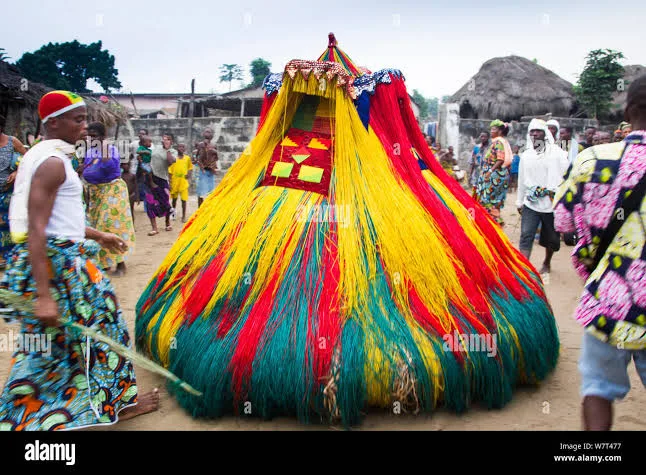

Nigeria’s spiritual and philosophical traditions are deeply rooted in its diverse cultures and ethnic groups, reflecting the country’s rich history and cultural complexity. Below are key topics on Nigerian spirituality and philosophy:
—
• Nigerian Spirituality
1. Traditional Religions
Yoruba Spirituality (Ifá/Orisha Worship):
Central to the Yoruba belief system is the worship of Olodumare (Supreme Being) through intermediaries called Orishas (e.g., Ogun, Sango, Yemoja).
Ifá divination, a system of knowledge and spiritual guidance, is central to this practice.
Igbo Spirituality (Odinani):
The belief in Chukwu (Supreme God) and Alusi (deities or spirits).
Ancestor veneration and the concept of Chi (personal spiritual guide).
Hausa/Fulani Spirituality:
Pre-Islamic practices involved spirit veneration and local deities, which coexist with Islamic influences in some communities.
2. Concept of the Supreme Being
Different ethnic groups have unique names and conceptions of the Supreme God:
Yoruba: Olodumare or Olorun
Igbo: Chukwu or Chi Ukwu
Hausa: Ubangiji (influenced by Islamic theology).
3. Spirits and Ancestors
Ancestor veneration is widespread across Nigerian ethnic groups, seen as a link between the physical and spiritual worlds.
Deities tied to natural elements like rivers, forests, and mountains (e.g., the River Niger as a sacred site).
4. Rituals and Festivals
Rituals for fertility, harvest, healing, and protection.
Examples include the Osun-Osogbo Festival (Yoruba), New Yam Festival (Igbo), and Durbar Festival (Hausa/Fulani).
5. Healing Practices and Divination
Use of herbs, incantations, and divination for physical and spiritual well-being.
Traditional healers (e.g., Babalawos among the Yoruba, Dibia among the Igbo).
6. Syncretism in Religion
Coexistence and blending of traditional beliefs with Christianity and Islam.
Practices such as Christian prayers alongside traditional rituals or the veneration of saints alongside Orishas.
—
Nigerian Philosophy
1. Concept of Chi (Igbo Philosophy)
A personal spiritual essence or guardian that influences one’s destiny.
Central to understanding individuality and free will within a communal context.
2. Yoruba Philosophy of Ori
Ori represents the inner head or spiritual destiny.
Emphasis on personal responsibility and alignment with one’s divine purpose.
3. Communalism
Nigerian philosophy emphasizes communal life and interconnectedness.
Common in Yoruba Ajobi/Ajogbe (family/clan ties) and Igbo Umunna (kindred or extended family).
4. Ethics and Morality
Focus on harmony, respect, and collective well-being.
Proverbs are a rich source of moral guidance, e.g., Yoruba: “Ile la n wo, ki a to somo loruko” (“We observe the home before naming a child”).
5. Leadership and Governance
Indigenous systems of governance based on councils of elders, chiefs, and kings (e.g., Yoruba Obas, Igbo Nze na Ozo, Hausa Emirs).
Emphasis on consensus and dialogue.
6. Time and Destiny
A cyclical understanding of time: the interplay of past, present, and future.
Beliefs in reincarnation (Ogbanje/Abiku among the Igbo and Yoruba).
7. Relational Philosophy (Ubuntu-like Concepts)
The Yoruba concept of Omoluabi (a person of good character).
Igbo emphasis on Onye Aghana Nwanne Ya (“Let no one leave his brother behind”).
8. Environmental Philosophy
Sacred connection to nature, with reverence for rivers, forests, and animals.
Practices promoting sustainable use of natural resources.
9. Proverbs and Oral Literature
Use of proverbs to express philosophical ideas.
Examples:
Yoruba: “Ti aba n ja, bi a ko ba d’owo, a ra ara wa.” (“When we fight, if we don’t break apart, we make peace”).
Igbo: “Nwaanyi muta ite ofe mmiri mmiri, di ya amuta itoolo onu.” (“If a woman cooks watery soup, her husband learns to dent his fufu heavily”).
10. Philosophy of Resilience and Resistance
Reflections on colonialism and its aftermath.
Philosophies tied to identity, freedom, and decolonization, as seen in works by Nigerian thinkers like Chinua Achebe, Wole Soyinka, and Frantz Fanon (Pan-Africanist influences).